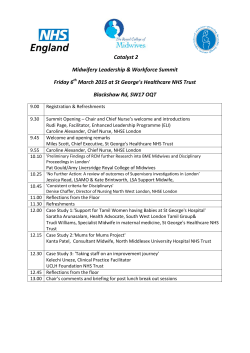
Ruth Chapmans presentation in PDF format
Appraisal: Problems and Lessons Learnt Dr Ruth Chapman NHS England Regional Appraisal Lead BMA 07.04.15 Problems/areas for development 1. Summative vs formative 2. Standardisation 3. Supporting information 2 NHSE London Presentation to BMA 07.04.15 1. Summative vs Formative 3 NHSE London Presentation to BMA 07.04.15 4 2. Standardisation of appraisal 5 NHSE London Presentation to BMA 07.04.15 Appraisers • Resources • Development • Benchmarking • Valuing the role 6 NHSE London Presentation to BMA 07.04.15 7 NHSE London Presentation to BMA 07.04.15 Sharing of information/standards National Appraisal Network (4 Regional Leads) DB Appraisal Leads Appraiser groups 8 NHSE London Presentation to BMA 07.04.15 QA appraisers • Doctors feedback • QA outputs • 1:1s • PDP 9 NHSE London Presentation to BMA 07.04.15 ASPAT Audit • Good scene setting, scope covered, revalidation stage • Strengths and achievements • Statements refer to evidence • Quality of evidence • Challenge • Details of feedback • Documentation of reflection • SMART PDPs, ?completed, link summary to PDP • No patient/third party identifiable info 10 NHSE London Presentation to BMA 07.04.15 3. Supporting information 11 NHSE London Presentation to BMA 07.04.15 12 NHSE London Presentation to BMA 07.04.15 Planning the appraisal • Timeline • Communication 13 NHSE London Presentation to BMA 07.04.15 Quality & quantity of SI • 6 types: CPD, QIA, SEA, feedback x2, complaints and compliments • 50 hours/college recommendations • Scope of work • Reflection • PDP 14 NHSE London Presentation to BMA 07.04.15 Reflection 15 NHSE London Presentation to BMA 07.04.15 Issues in appraisal • Has reflected but just hasn’t documented – early recognition prior to 1:1 is helpful but reflection can also been drawn out within the conversation • Has not been taught how to reflect • Resistant, non-engager, lacking insight, arrogant 16 NHSE London Presentation to BMA 07.04.15 Questions to prompt reflection What went well? What could have been done better? How will this learning/case/experience affect me personally and my practice? How will it improve my patient care and how can I demonstrate that objectively? How can I disseminate this learning to my colleagues? 19 NHSE London Presentation to BMA 07.04.15 20 NHSE London Presentation to BMA 07.04.15 Supporting information • Appraisers to sign post • GMC and college guidance 21 NHSE London Presentation to BMA 07.04.15 In summary Problems/areas for development 1. Summative vs formative 2. Standardisation 3. Supporting information 22 NHSE London Presentation to BMA 07.04.15 23 NHSE London Presentation to BMA 07.04.15 24 NHSE London Presentation to BMA 07.04.15 Thank you 25 NHSE London Presentation to BMA 07.04.15 Any questions? 26 NHSE London Presentation to BMA 07.04.15 Useful references http://www.gmc-uk.org/ Supporting_information__for_appraisal_and_revalid ation.pdf_48977650.pdf http://www.londondeanery.ac.uk/professionaldevelopment/appraisal-and-revalidation-support/elearning/files/appraisal-and-revalidation-reflection/ view 27 NHSE London Presentation to BMA 07.04.15 Mann K et al Reflection and reflective practice in health professions education: A systematic review Adv in health sci educ (2009) 14:595-621 There is evidence of the value of reflection Reflection can be measured Reflective thinking can be developed with interventions 28 NHSE London Presentation to BMA 07.04.15 GMC Good Medical Practice The unacceptable GP; has limited insight into the current state of his or her knowledge or performance The GMC, Good Medical Practice 29 NHSE London Presentation to BMA 07.04.15 Boud et al. (1985) define reflection as… ‘‘a generic term for those intellectual and affective activities in which individuals engage to explore their experiences in order to lead to a new understanding and appreciation’’ 30 NHSE London Presentation to BMA 07.04.15 GMC 2012 Commitment to improving practice tends to flourish where reflective practice and quality improvement is actively supported MC 2012 31 NHSE London Presentation to BMA 07.04.15
© Copyright 2025









